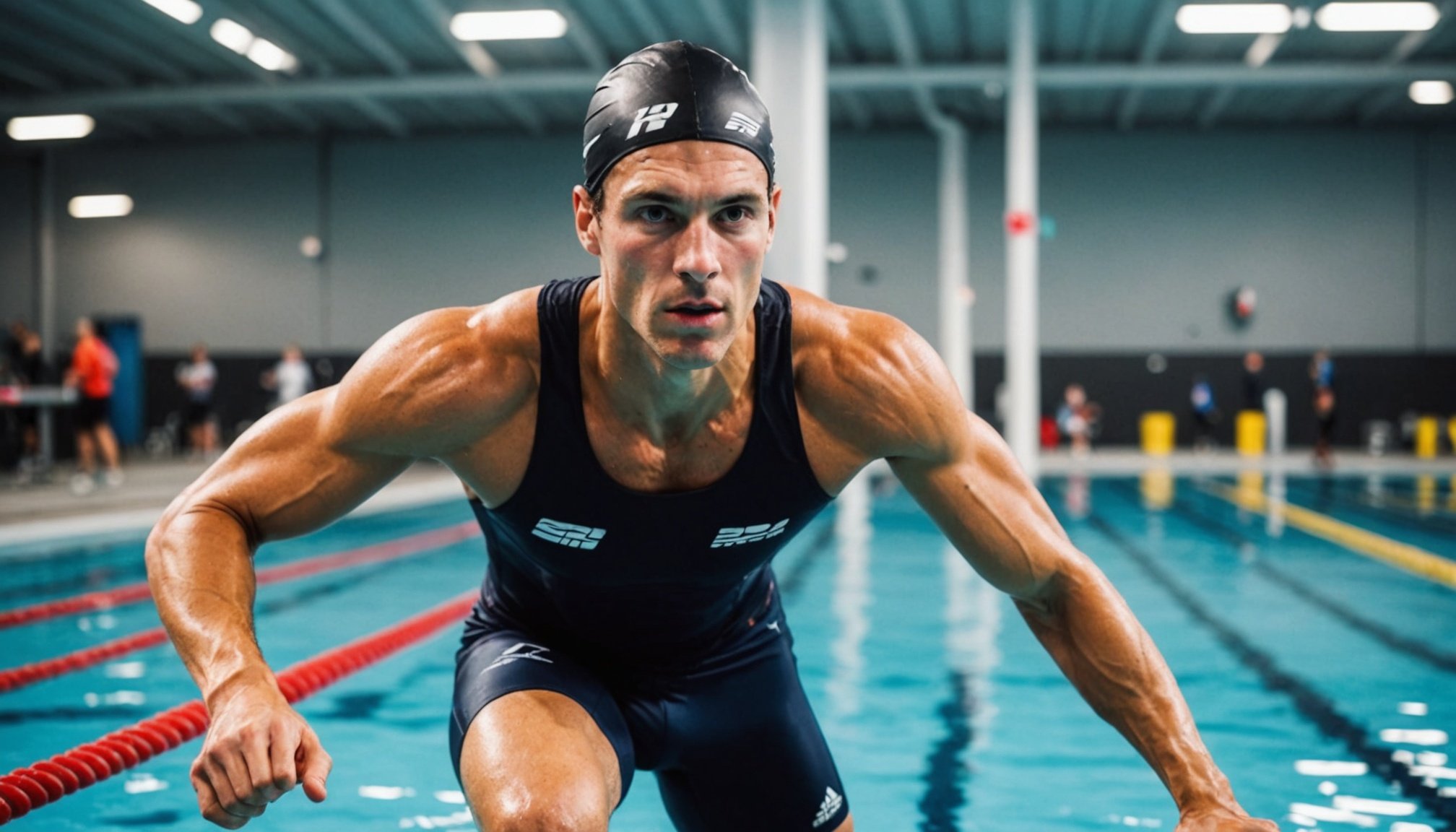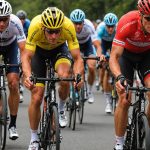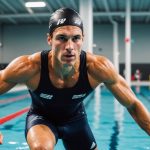Essential Macronutrients for Swimmers
Swimmers require a well-balanced macronutrient intake to fuel their bodies for peak performance. One of the most crucial macronutrients is carbohydrates, which serve as a primary energy source during high-intensity training and competitions. They help replenish glycogen stores, ensuring that athletes have the stamina to endure extensive workouts and races. Including whole grains, fruits, and vegetables in a swimmer’s diet provides ample carbohydrates along with essential vitamins and minerals.
Proteins play a significant role in muscle recovery and growth. After intense training sessions, consuming protein aids in repairing and building muscle tissue. Sources such as lean meats, dairy products, and legumes should be incorporated into meals to support these essential recovery processes.
In the same genre : Discovering excellence: top cross-training techniques to elevate competitive figure skaters
Meanwhile, healthy fats offer a source of sustained energy, especially beneficial during longer sessions in the pool. These can be sourced from foods like avocados, nuts, and seeds, providing not only energy but also essential fatty acids that support overall health.
Understanding the balance and functionality of these macronutrients can guide swimmers in designing a dietary plan that supports training goals and boosts performance, enabling them to push their limits with confidence.
Also to read : Unlocking Athletic Resilience: Proven Tactics to Triumph Over Major Sports Setbacks
Key Vitamins and Minerals
Vital vitamins play an essential role in supporting a swimmer’s energy production and maintaining a robust immune function. Vitamin B complex, for example, is crucial for converting food into energy, making it indispensable for stamina and endurance. Moreover, adequate levels of Vitamin C and Vitamin D are necessary to bolster immune defenses, which can be particularly beneficial during intense training phases.
Alongside vitamins, minerals such as calcium, magnesium, and potassium are fundamental for optimal muscle function and maintaining proper hydration. Calcium and magnesium facilitate muscle contraction and relaxation, which are vital during consistent swimming practices. Potassium, on the other hand, helps in maintaining electrolyte balance, thus preventing cramps or fatigue.
Incorporating these vitamins and minerals into a swimmer’s diet can be achieved through varied food sources. Leafy greens, dairy products, and nuts can supply ample amounts of calcium and magnesium. Citrus fruits and oily fish are excellent sources of Vitamin C and D, respectively. Striving for a diverse diet ensures swimmers meet their nutritional needs, sustaining top-notch performance and overall health.
Timing of Nutritional Intake
Understanding nutritional timing is crucial for maximizing a swimmer’s performance. Ideally, consuming carbohydrates 30 to 60 minutes before training provides immediate energy and helps enhance endurance. A balance of simple and complex carbohydrates ensures quick yet sustained energy release. Post-workout, a carbohydrate-rich meal aids in replenishing glycogen stores.
Proper protein consumption post-training is essential for muscle repair. To benefit from the muscle-building window, ingest a protein-rich snack or meal within 30 minutes after exercising. This practice helps streamline recovery, minimizing muscle breakdown while promoting growth.
Meal frequency also plays a vital role. Eating small yet frequent meals, balanced in macronutrients, can prevent fatigue and sustain energy levels. This approach stabilizes blood sugar levels, allowing athletes to maintain peak physical and mental performance throughout the day.
When considering nutritional timing, it’s beneficial to pre-plan meals around training schedules. This ensures a swimmer is never caught unprepared, promoting consistent energy availability and optimal recovery support. Implementing these strategies can redefine a swimmer’s performance, offering them an edge in a competitive environment.
Hydration Strategies
Maintaining hydration is crucial for swimmers to uphold their performance levels. Even mild dehydration can negatively affect an athlete’s physical output, leading to decreased endurance and increased risk of cramps. This emphasises the importance of consistent fluid intake. To help counter this, ensuring an intake of electrolyte-rich beverages can sustain balance and increase absorption rates.
Electrolytes like sodium, potassium, and magnesium play significant roles in muscle function and overall fluid equilibrium. They are often lost through sweat, so their replenishment is essential. Consuming drinks designed for athletes can provide these necessary components.
Tracking hydration can also prevent overhydration, which is equally detrimental. While sports water bottles commonly have measurements, another method is observing urine colour. A pale straw hue typically signals adequate hydration.
To help swimmers stay hydrated, here’s a tip: develop a hydration routine. Encourage sipping water or a sports drink before, during, and post-training. Consistent fluid consumption will ensure that hydration levels remain stable, aiding the athlete in both training sessions and competitive events. This strategy not only preserves performance but also promotes overall well-being in aquatic sports.
Supplements for Enhanced Performance
In competitive swimming, supplements can play a role in enhancing performance, but should be used thoughtfully. Among the plethora of options, some come highly recommended based on research. Creatine is a popular choice, noted for improving muscle power and reducing fatigue during intense training. Studies indicate that it helps increase energy stores for short bursts of speed, which is crucial in swimming races.
Beta-alanine is another supplement that supports endurance, allowing swimmers to keep going without tiring quickly. It works by buffering acid in muscles, delaying the onset of fatigue. This is particularly beneficial during long training sessions or distance races. Caffeine is recognised for its capacity to heighten alertness and concentration. In swimming, it assists in sustaining focus and endurance, especially in morning events.
However, swimmers should be aware of potential downsides and choose supplements wisely. The emphasis is on quality and safety — not all supplements are regulated. Consultation with a sports nutritionist can offer tailored advice, ensuring that any use aligns with sports nutrition guidelines and individual needs. Such informed decisions can maximize benefits while minimizing risks.
Meal Planning for Swimmers
Creating a structured meal plan is crucial for balancing macronutrients and micronutrients, ensuring swimmers meet their dietary needs effectively. A well-rounded plan focuses on the integration of carbohydrates, proteins, and fats to support energy and recovery phases. Including ample carbohydrates like brown rice, sweet potatoes, and quinoa is essential for energy and rapid recovery.
For simple yet nutritious recipes, swimmers can explore options such as protein-packed smoothies or grilled chicken with vegetables. These meals are designed to deliver essential proteins, promoting muscle repair and growth after training. Maintaining a balance with healthy fats from sources like avocados or olive oil ensures prolonged energy supply.
Sports nutritionists suggest prepping meals ahead of a busy schedule, enabling consistent meal planning without sacrificing nutritional qualities. Following a routine that includes planned snacks and meals enhances performance by preventing fatigue.
Tips from experts: Prioritise nutrient-dense foods and maintain hydration with water-rich fruits and vegetables. Listen to your body’s hunger cues and adjust portion sizes accordingly. This method encourages swimmers to stay fuelled, promoting optimal performance both in training and during competitions.
Insights from Experts
Swimmers and their coaches often turn to sports nutrition professionals for guidance on dietary habits that lead to success. Experienced swim coaches emphasise the impact of nutrition on performance, with insights highlighting a well-rounded diet that includes plenty of macronutrients. For instance, Coach Jane Doe explains, “A balanced intake of carbohydrates and proteins post-training is crucial for glycogen restoration and muscle repair.” This advice underscores the importance of timing and nutrient synergy.
Prominent sports nutritionists often recommend strategic meal planning. Dr. John Smith remarks, “Integrating a variety of nutrients through whole foods supports not just energy needs but overall health, essential for high-level athletes.” This approach ensures swimmers consistently fuel their bodies adequately.
Case studies further illustrate the practical application of nutrition strategies. Successful swimmers, such as Olympian Michael Phelps, have shared insights on their dietary regimen, including the critical role of balanced meals in sustaining high performance.
Incorporating experts’ advice into daily routines can yield significant benefits, facilitating both physical endurance and recovery. For swimmers aspiring to reach their full potential, aligning their nutrition strategy with expert recommendations is a valuable and insightful approach.











